A landmark Supreme Court ruling that fees charged to people bringing employment tribunal claims are unlawful is a blow to the UK Government and a triumph for democracy, a leading lawyer said yesterday.
The government is to take immediate steps to stop charging employment tribunal fees and will also refund people who have already paid.
The Ministry of Justice said it accepted the judgment in favour of public sector union Unison, which has fought a four-year battle against controversial fees of up to £1,200 for taking a case to a tribunal.
Judges ruled unanimously in favour of the union, which had argued that fees discriminated against women and other groups of workers.
The court also ruled that the government acted unlawfully and unconstitutionally when it introduced the fees four years ago.
Unison estimated the government will have to refund more than £27million to the thousands of people charged for taking claims to tribunal since July 2013, when fees were introduced by Chris Grayling, the then lord chancellor.
Alison Woods, Aberdeen-based partner and employment specialist at legal firm CMS, said: “Today’s ruling will be a blow to the UK Government.
“The introduction of fees has resulted in a sharp decline of tribunal applications and raised questions about whether workers were being priced out of the justice system.
“Today’s judgement has really reflected that view by stating that the courts are not simply a service provider but are rather a fundamental aspect of our democracy.
“Many employers will, however, be disappointed. Prior to fees being introduced, their complaint was that employees had a free ride with nothing to lose in pursuing an employment tribunal claim as costs were rarely awarded in practice.”
